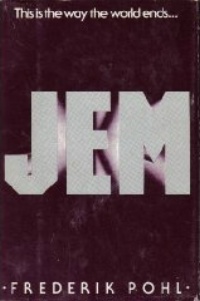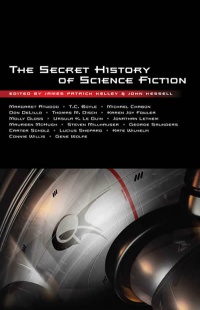 In various profiles of Frederick Pohl, I have more than once seen Jem (1979) listed as one of his best and most important novels. After giving it a read I can see why it’s considered “important,” but I haven’t read enough of his work (at the time of this writing) to know if it’s really one of his “best” or not. This is a book packed with very pointed comments about politics, power, greed, war, imperialism, and the uglier side of humanity in general, and for that it deserves its due. From a storytelling standpoint, however, it’s not quite as successful. Certain elements of plot and character are unconvincing or out of place, making immersion in this fictional world more difficult. Nevertheless, it’s still a worthy investment of reading time.
In various profiles of Frederick Pohl, I have more than once seen Jem (1979) listed as one of his best and most important novels. After giving it a read I can see why it’s considered “important,” but I haven’t read enough of his work (at the time of this writing) to know if it’s really one of his “best” or not. This is a book packed with very pointed comments about politics, power, greed, war, imperialism, and the uglier side of humanity in general, and for that it deserves its due. From a storytelling standpoint, however, it’s not quite as successful. Certain elements of plot and character are unconvincing or out of place, making immersion in this fictional world more difficult. Nevertheless, it’s still a worthy investment of reading time.
The story is set in a near future in which the nations of Earth have arranged themselves into three large-scale alliances: the Food Bloc, the Fuel Bloc, and the People Bloc. The three entities exist in essentially Cold War conditions, with minor skirmishes here and there, but managing to avoid any major wars through the strategy of Mutually Assured Destruction. That’s Earth, one of the story’s two locations; the other is a newly discovered planet, Jem, that happens to be habitable by humans. The three Blocs send their own separate expeditions to this new world to investigate its lifeforms, resources, and colonization potential. Officially they are bound by treaty to cooperate and share information; but the reality is far different, as each camp races for advantage and domination of Jem for its own benefit.
This race to exploit a new world isn’t hindered in the slightest by the discovery that Jem has its own indigenous intelligent life, three species in fact. Although sentient, these natives of Jem are primitive, and thus in no position to put up a fight against the invading humans, most of whom never even question the moral implications of what they’re doing. The Jemman natives are seen as a resource to be used and profited from, nothing more. One of the main movers and shakers behind the Food Bloc expedition describes one of the Jemmans’ expected roles:
“For openers, Dr. Ravenel, I’d like to see your people create some trade goods. For all three races. They’re all going to be our customers one of these days.”
This shot at unrestrained commercialism brings back fond memories of Pohl’s classic, The Space Merchants, which tackles the same problem much more thoroughly.
But the Jemmans are seen not only as future consumers, but also as recruits in the humans’ ever escalating series of conflicts. They are manipulated and pitted against each other as the alien invaders become more and more open and brash in their machinations. Finally, the situation devolves into all-out war, and not only on Jem:
The world she had left was blowing itself up, and the world she had come to seemed determined to do the same.
What happens in the end — annihilation or survival? — I’ll leave for you to discover on your own.
What I really like about this book is Pohl’s sense of political reality, his no-holds-barred skewering of our species’ arrogance, and his ability to illuminate deeply fundamental human flaws very simply, often in a single sentence, such as this one that brings to mind Orwell’s “more equal than others” line:
“But learning to live together doesn’t mean that some people can’t live a little better than others.”
The main problem I have with the book is that it can’t quite decide if it wants to be a serious straightforward novel, or if it wants to be satire. For the most part it comes across as serious. But then there are certain situations and events that could have come right out of a Robert Sheckley story. For instance, during one camp’s first contact with an intelligent Jemman species, one member tries to communicate, while another, with no apparent sense of incongruity, starts shooting them to collect specimens! This equivocation between the serious and the satirical lessens the novel’s impact, I feel. Also, some of the characters feel less like real human beings, and more like caricatures of various personality types; and there is little progression or change in them over the course of the story.
Even with those flaws, though, Jem still has a lot to say and is worth reading.















Good review and I agree with your assessment that Jem is a bit schizophrenic in tone at times. Still, as you say, well worth reading, though I’m not sure if it could still be considered one of Pohl’s best.
Pohl definitely had a black sense of humor. Most of his good stuff is written in that mode. One thing I liked about him though is that each time he used humor, it was a bit different. Gateway was straight sarcasm. Man Plus was very fatalitic. Space Merchants was frustrating, but humor was mixed into all of them, this one included, to different effect. I liked this one as a spreadable dystopia.
i am very glad to have to read this article if u have helped me again its a greate dealn of knowledge on this article i would love to read more of your aticle thank u so much for posting this article
Pingback: Jem by Frederik Pohl « Golden Age Of Science Fiction, Pohl, Asimov, Clarke
Jem is a fantastic journey to another planet, where the air abounds with an ocean of life. where the creatures talk their own language, and learn each-others, especially after aliens to their world appear, kidnapping and destroying some of them.
Pingback: Jem by Frederik Pohl (1979) | Science Fictions Golden Age